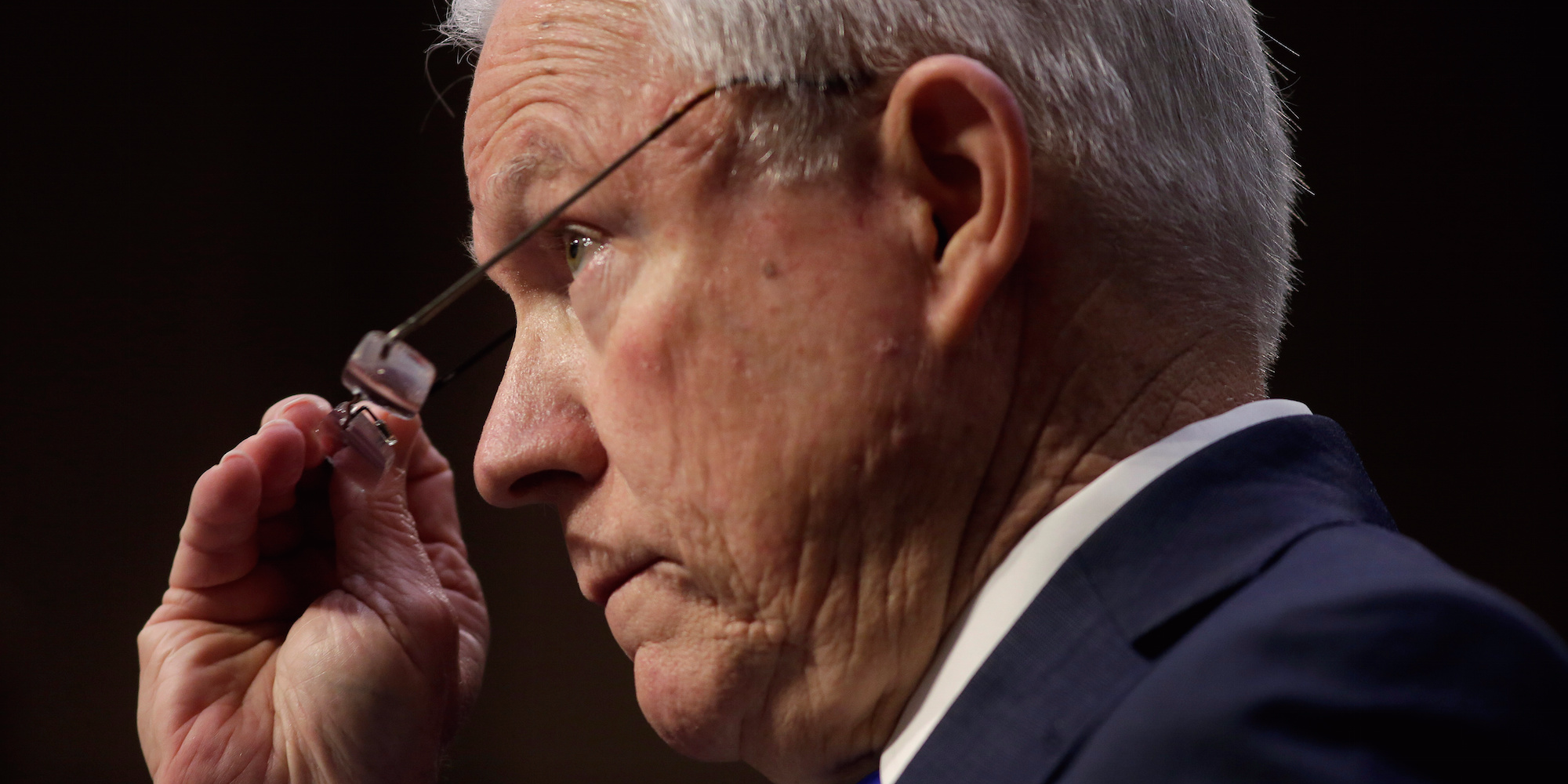- Attorney General Jeff Sessions is said to be considering appointing a second special counsel to investigate issues related to former Democratic presidential nominee Hillary Clinton, former FBI Director James Comey, and the Obama administration.
- Sessions’ contemplation comes after the House Judiciary Chairman urged him to look into Comey’s handling of the FBI’s investigation into Clinton’s email use, the 2010 Uranium One deal, and the Clinton Foundation.
- Trump has repeatedly called Sessions a “weak” attorney general and pushed him to investigate Clinton and the Democrats as the FBI investigates Trump and his campaign for possible collusion with Moscow during the 2016 election.
Attorney General Jeff Sessions is considering appointing a second special counsel tasked with investigating several issues related to former Democratic nominee Hillary Clinton and former FBI Director James Comey, The Washington Post reported on Monday.
Sessions began contemplating the option after House Judiciary Committee chairman Robert Goodlatte asked Sessions in July and September to appoint a special counsel to investigate “matters which may be outside the scope” of special counsel Robert Mueller’s investigation of Russian interference in the 2016 election, including whether members of President Donald Trump’s campaign colluded with Moscow to sway the election in his favor.
Of particular concern to Goodlatte were some actions taken by officials in former President Barack Obama’s administration, including former attorney general Loretta Lynch, Comey, and Clinton.
The September letter came following revelations that during his tenure as FBI director, Comey prepared a statement ending the bureau’s investigation into Clinton’s use of a private email server to conduct government business while she was secretary of state.
In addition to investigating the FBI's handling of the Clinton email controversy, Goodlatte also urged that a second special counsel be appointed to look into the Clinton Foundation's dealings, and the 2010 Uranium One deal, which was approved by the Obama administration.
The deal, which Republicans have painted as evidence of collusion between Clinton and Russia, made its way back into headlines in October, shortly before it emerged that a federal grand jury approved the first charges filed by special counsel Robert Mueller as he investigates whether the Trump campaign colluded with Moscow.
Soon after The Hill published a story about the deal earlier in October, Trump latched onto it, tweeting that the "Uranium deal to Russia, with Clinton help and Obama Administration knowledge, is the biggest story that Fake Media doesn't want to follow!"
Though Trump's allies have pointed at the deal as damning evidence against Clinton, extensive reporting and fact-checking have found no signs of wrongdoing when the Obama administration allowed Rosatom, a Russian nuclear energy firm, to acquire Canada-based Uranium One, which had significant mining stakes in the US. The deal required approval from several government agencies, including the Nuclear Regulatory Commission, which Clinton had no control over, The New Yorker reported.

Comey takes center stage
Goodlatte, according to The Post and the two letters he sent through the House Judiciary Committee, appears to be focusing particularly on Comey, and has asked that a second special counsel investigate "leaks" about his private conversations with Trump.
Goodlatte was likely referring to the explosive memo whose contents Comey asked a friend to provide to The New York Times in May, in which Comey documented a February conversation he had with Trump.
The memo was leaked shortly after Trump fired Comey. At first, the White House said he was fired because of his handling of the Clinton email investigation. But Trump later told NBC's Lester Holt that "this Russia thing" had been a factor in his decision. Comey was spearheading the FBI's investigation into whether the Trump campaign colluded with Russia when he was fired.
During the February meeting Comey documented in his memo, the president asked him to drop the ongoing FBI investigation into former national security adviser Michael Flynn.
"He is a good guy," Trump told Comey, according to the memo. "I hope you can let this go."
The conversation took place one day after Flynn resigned, when it emerged that he had misled Vice President Mike Pence about his contacts with Russia's ambassador to the US, Sergey Kislyak.
Trump branded Comey a "leaker" and a liar after Comey told the Senate Intelligence Committee in June that he had asked his friend, Columbia law professor Daniel Richman, to disclose the contents of the memo to The Times.
Though Trump and other Republican lawmakers have consistently homed in on Comey's actions, legal experts have determined that the former FBI director did nothing wrong.
After Goodlatte voiced his concerns about Comey, the Clintons, and Obama administration officials, Assistant Attorney General Stephen E. Boyd wrote that Sessions had "directed senior federal prosecutors to evaluate certain issues raised in your letters," according to The Post.
Boyd added that the prosecutors would "report directly to the Attorney General and Deputy Attorney General, as appropriate, and will make recommendations as to whether any matters not currently under investigation should be opened, whether any matters currently under investigation require further resources, or whether any matters merit the appointment of a Special Counsel."
This revelation comes amid Trump's claims that special counsel Robert Mueller's investigation into him and his campaign is a politically-motivated "witch hunt." He has repeatedly called Sessions - who recused himself in March from all matters relating to the 2016 campaigns and the Russia investigation after it emerged that he had not disclosed his conversations with Kislyak - a "weak" attorney general, and urged the DOJ and Republicans to investigate Clinton and the Democrats for their alleged "collusion" with the Russians.

